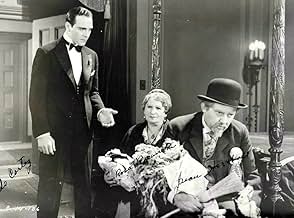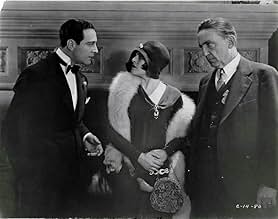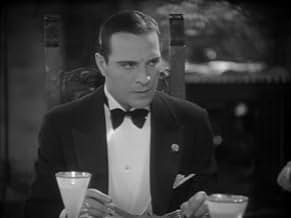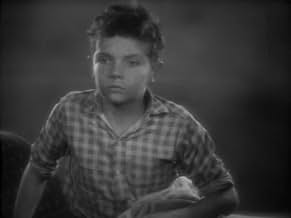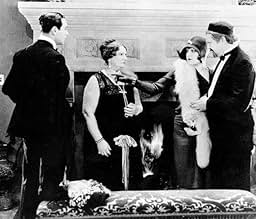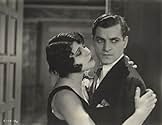Soap-opera about a social-climbing Jewish man and his old-world parents who are heartbroken by his rejection of them.Soap-opera about a social-climbing Jewish man and his old-world parents who are heartbroken by his rejection of them.Soap-opera about a social-climbing Jewish man and his old-world parents who are heartbroken by his rejection of them.
- Director
- Writers
- Stars
Syd Crossley
- Goldfish's Butler
- (as Sid Crossley)
Joe Bordeaux
- Crook
- (uncredited)
Ferike Boros
- Delancey Street Woman
- (uncredited)
Clarence Burton
- Police Desk Sergeant
- (uncredited)
Paul Ellis
- Crook
- (uncredited)
Ruth Feldman
- Market Woman
- (uncredited)
Otto Fries
- Tradesman
- (uncredited)
Julia Swayne Gordon
- Mrs. Striker
- (uncredited)
Donald Hall
- Minor Role
- (uncredited)
Leon Janney
- Eddie Lesser as a Boy
- (uncredited)
Julanne Johnston
- Irma Striker
- (uncredited)
Virginia Marshall
- Birdie Goldfish as a Girl
- (uncredited)
- Director
- Writers
- All cast & crew
- Production, box office & more at IMDbPro
Featured reviews
Younger Generation, The (1929)
** 1/2 (out of 4)
Early Capra melodrama has poor Jewish family taken out of the ghetto by their youngest son (Ricardo Cortez) who strikes it big. He moves his father (Jean Hersholt), mother (Rosa Rosanova) and sister (Lina Basquette) into a large house and expects them to do what he says and stay away from the "filth" they grew up around. Soon the three start to realize that money can't buy happiness but will the son learn this before it's too late? At this point in time Columbia was still a very small studio so they couldn't afford to go all in in terms of sound movies so this is another example of a silent with a few sound segments scattered throughout the film. I've always found this to be incredibly distracting but I think Capra does a great job at when to use the sound and I also think the quality of the recorded words is among the best I've heard from this era. Considering how poor the studio was it's rather shocking that some of the other studios early talkies didn't come off sounding better. With that said, there are some major problems with the film but for the most part it's a nice time filler that fans of the director will want to check out. The biggest problem is that even in 1929 this material was way too predictable. There's really not a single thing that happens in the film that you won't see coming from a mile away. The format pretty much follows every morality film that came before it and I just wish at some point Capra would have shaken things up just to keep us off guard or at least in some drama. It should come as no shock that Capra does a great job with what's here and manages to keep the film moving quite fast and he keeps it as entertaining as the screenplay will allow. The cast also keeps things moving nicely with their fine performances. Cortez would play this type of role countless times in his career and he always managed to do good with it. Hersholt clearly steals the film as the tortured father. In the end, this isn't the greatest film ever made but I think Capra did the most he could considering what he had to work with. I think those who like to search out these early talkies will find the quality here to be above average and will make one wonder why some of the bigger studios didn't have their stuff sounding as good.
** 1/2 (out of 4)
Early Capra melodrama has poor Jewish family taken out of the ghetto by their youngest son (Ricardo Cortez) who strikes it big. He moves his father (Jean Hersholt), mother (Rosa Rosanova) and sister (Lina Basquette) into a large house and expects them to do what he says and stay away from the "filth" they grew up around. Soon the three start to realize that money can't buy happiness but will the son learn this before it's too late? At this point in time Columbia was still a very small studio so they couldn't afford to go all in in terms of sound movies so this is another example of a silent with a few sound segments scattered throughout the film. I've always found this to be incredibly distracting but I think Capra does a great job at when to use the sound and I also think the quality of the recorded words is among the best I've heard from this era. Considering how poor the studio was it's rather shocking that some of the other studios early talkies didn't come off sounding better. With that said, there are some major problems with the film but for the most part it's a nice time filler that fans of the director will want to check out. The biggest problem is that even in 1929 this material was way too predictable. There's really not a single thing that happens in the film that you won't see coming from a mile away. The format pretty much follows every morality film that came before it and I just wish at some point Capra would have shaken things up just to keep us off guard or at least in some drama. It should come as no shock that Capra does a great job with what's here and manages to keep the film moving quite fast and he keeps it as entertaining as the screenplay will allow. The cast also keeps things moving nicely with their fine performances. Cortez would play this type of role countless times in his career and he always managed to do good with it. Hersholt clearly steals the film as the tortured father. In the end, this isn't the greatest film ever made but I think Capra did the most he could considering what he had to work with. I think those who like to search out these early talkies will find the quality here to be above average and will make one wonder why some of the bigger studios didn't have their stuff sounding as good.
Morris Goldfish grew up on New York's poor Lower East Side with his Jewish family. His father is a fun loving guy with all his friends but they don't have much money. The kids accidentally burn down their home but Morris fights to save their valuables. He uses the same tenacity to be a successful business and moves the family to rich Fifth Avenue. His father is tired of the stuffy social climbing from Morris and not happy being no longer the head of the household while mother and sister Birdie are overjoyed with their rise in status. Morris changes him name from Goldfish to Fish.
This is my earliest Frank Capra film. It is silent except for some synchronized music and some talking sequences. It's always fascinating to see incremental advancements in technology. This mix of silent and sound is a real platypus. It actually affects the tone and the style of the movie. Of course, all of that is beyond the filmmaker's intention. It's just the sense from a modern viewer.
The father son relationship is pure Capra. It's a familiar Capra theme of money don't buy you happiness. I love the path that the movie is going on until Birdie and her boyfriend become the nexus of the plot in the middle. It's too much. Quite frankly, Morris can simply kick Birdie out for marrying poor. The whole crime is contrived. The movie does go back to the father son relationship which is a good thing. The big climatic moment in the lobby is both effective and flawed. There needs to be something more obvious for Morris to deny his parents. In the movie, he's already suppose to introduce his parents to the upper crust guests during the dinner. It needs an extra push. It needs his guest to say something derogatory about them being poor. It's a great moment but it needs a better reason for Morris. Overall, the movie gets a bit too melodramatic. This is a great film for Capra fans and they would be very familiar with the theme.
This is my earliest Frank Capra film. It is silent except for some synchronized music and some talking sequences. It's always fascinating to see incremental advancements in technology. This mix of silent and sound is a real platypus. It actually affects the tone and the style of the movie. Of course, all of that is beyond the filmmaker's intention. It's just the sense from a modern viewer.
The father son relationship is pure Capra. It's a familiar Capra theme of money don't buy you happiness. I love the path that the movie is going on until Birdie and her boyfriend become the nexus of the plot in the middle. It's too much. Quite frankly, Morris can simply kick Birdie out for marrying poor. The whole crime is contrived. The movie does go back to the father son relationship which is a good thing. The big climatic moment in the lobby is both effective and flawed. There needs to be something more obvious for Morris to deny his parents. In the movie, he's already suppose to introduce his parents to the upper crust guests during the dinner. It needs an extra push. It needs his guest to say something derogatory about them being poor. It's a great moment but it needs a better reason for Morris. Overall, the movie gets a bit too melodramatic. This is a great film for Capra fans and they would be very familiar with the theme.
10mmipyle
Watched "The Younger Generation" (1929) with Jean Hersholt, Lina Basquette, Ricardo Cortez, Rosa Rosanova, Rex Lease, Syd Crossley, and others. Concerning a Jewish family from NYC's lower east side. Directed by Frank Capra, this is silent with three short talkie sequences and a music and sound effects overlay otherwise. Hersholt is content in his surroundings, and loves to joke and laugh and be merry with fellow street hawkers, while his wife, Rosanova, wishes to move up and out of the life they're in. Son Cortez is already hawking newspapers and making money at a very young age, set to rise out of this life and onto Fifth Avenue. His sister, Basquette, is the apple of her father's eye, and she is enamored of a young harmonica player, Lease. He wishes to become a song writer. Cortez and he are at odds from early childhood. As years pass, Cortez becomes ultra successful and moves, taking his family with him, up to Fifth Avenue and tremendous wealth. But the happiness that was seemingly inherent in most of the family is now barred by a steely front of money and vapid social status. Eventually, Cortez actually snubs his family, calling them foolish servants in front of invited wealthy acquaintances so that he won't have to admit that they're his parents. His parents are shattered. The scene is shattering! The final scene, after several circumstances with Lease and Basquette in-between, is also shattering. How Cortez is situated at the end is monumentally shattering.
This moral fable is brilliantly executed by all involved. For me, this was the best performance I've ever seen Cortez give. I was bothered near the beginning with some of Cortez' hand placements which reminded me too much of stage performing and less of film acting. Other than that, the other performances are nothing short of great. The film, though possibly not for everybody, especially if you're turned off by moral fables, is revelatory for the period. It will instantly remind many of "His People" (1925) with Rudolph Schildkraut if any are familiar with that silent; they're nearly the same story, and, curiously enough, Rosa Rosanova is in both films. The film's Jewish circumscription is felt through and through, and Capra has obviously purposely made that choice. The ethnic aura makes the film even more compelling. The prayer that Hersholt prays near the end is supremely moving in context, and the resulting events are the threading of the needle sewing the coming tapestry.
Simply outstanding! The print was also nearly perfect, and the sound was actually well done for 1929. The talkie sequences don't necessarily add anything special to the film, but must have been very satisfying to audiences when the film was released. The sequences don't seem to be like other goat-glanded films of the era, but the sound is used in conjunction with the rest of the film. The final sequence before the very end scene is sound. The end scene itself, which is profoundly silent, is tremendously moving because of its silence. Highly recommended!
This moral fable is brilliantly executed by all involved. For me, this was the best performance I've ever seen Cortez give. I was bothered near the beginning with some of Cortez' hand placements which reminded me too much of stage performing and less of film acting. Other than that, the other performances are nothing short of great. The film, though possibly not for everybody, especially if you're turned off by moral fables, is revelatory for the period. It will instantly remind many of "His People" (1925) with Rudolph Schildkraut if any are familiar with that silent; they're nearly the same story, and, curiously enough, Rosa Rosanova is in both films. The film's Jewish circumscription is felt through and through, and Capra has obviously purposely made that choice. The ethnic aura makes the film even more compelling. The prayer that Hersholt prays near the end is supremely moving in context, and the resulting events are the threading of the needle sewing the coming tapestry.
Simply outstanding! The print was also nearly perfect, and the sound was actually well done for 1929. The talkie sequences don't necessarily add anything special to the film, but must have been very satisfying to audiences when the film was released. The sequences don't seem to be like other goat-glanded films of the era, but the sound is used in conjunction with the rest of the film. The final sequence before the very end scene is sound. The end scene itself, which is profoundly silent, is tremendously moving because of its silence. Highly recommended!
A young Frank Capra slips easily into a milieu you wouldn't expect him to have much feel for--the Jewish Lower East Side--in this early talkie, adapted from a Fannie Hurst novel. Hurst wrote soap operas that validated the feelings of the common woman, but here she's more intent on portraying immigrant Jews, a subculture most of America probably knew and thought little about, with dignity and empathy. And the histrionics are effective. Capra always had a way with actors, and he helps Jean Hersholt, as the stuck-in-his-ways paterfamilias, and Lina Basquette, as a feisty but sympathetic daughter, to their best performances. Ricardo Cortez is more of a natural as the son than you think--he was born Jake Krantz. The early-talkie format, with some scenes with dialogue and others with titles and sound effects, is awkward--if we can hear footsteps and doors slamming, why can't we hear dialogue?--and the not-too-happy ending, with the son punished for his acquisitiveness, is a bit of a downer. But it's loaded with atmosphere, and shows Capra learning his trade quickly.
I just had the opportunity to see this film on our most valuable classic film resource, TCM. It was good to see, purely for historic purposes regarding Frank Capra's career. One good thing about the silent parts is that if you had taped or Tivo'd the film, you can scan the silent scenes at double speed and still follow the story. One curious thing (stemming from the original story) stood out for me though; if I wanted to change my name from Goldfish to a classier name, I would surely change it to Gold instead of Fish! After all, Samuel Goldfish changed his name to Goldwyn. I say, when in doubt, keep the Gold and lose the Fish!
Did you know
- TriviaFirst part-dialog sound film for Columbia Pictures and director Frank Capra. Both wanted to make an all-talking film, but equipped sound stages were at a premium at the time.
- GoofsWhen Birdie tells Eddie (via intertitle) that his song has been sold for $1000, he excitedly mouths the words "Five thousand?"
- Quotes
Title Card: New York's Lower East Side--a melting pot, where the younger generation struggles to free itself from the old-world ideas of its fathers.
- ConnectionsFeatured in Frank Capra's American Dream (1997)
Details
- Release date
- Country of origin
- Language
- Also known as
- Mlada generacija
- Filming locations
- Production company
- See more company credits at IMDbPro
- Runtime
- 1h 15m(75 min)
Contribute to this page
Suggest an edit or add missing content

